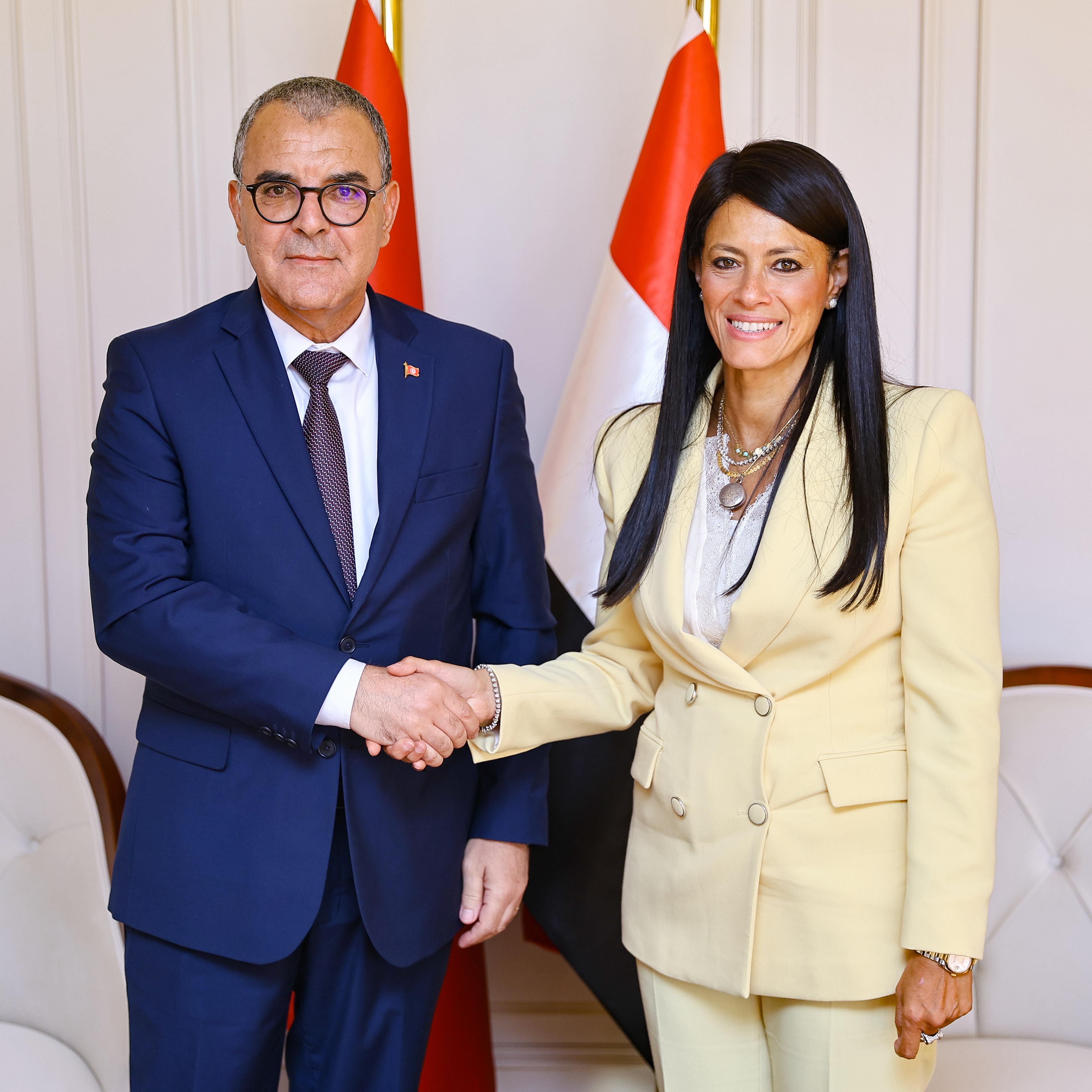• الدكتورة رانيا المشاط: نعمل على الانتهاء من اللائحة التنفيذية لقانون التخطيط العام للدولة.. وبدء إعداد خطة التنمية الاقتصادية والاجتماعية متوسطة الأجل من العام المالي 2026/2027
استقبلت الدكتورة رانيا المشاط، وزيرة التخطيط والتنمية الاقتصادية والتعاون الدولي، السيد/ سمير عبد الحفيظ، وزير الاقتصاد والتخطيط التونسي، وذلك ضمن فعاليات الدورة الثامنة عشرة للجنة العليا المصرية التونسية المشتركة، التي تنعقد من 8-11 سبتمبر الجاري بالقاهرة،
شهد اللقاء مناقشة تعزيز أوجه التعاون المشترك بين البلدين، وفرص تبادل الخبرات على صعيد ملفات الوزارتين.
ورحبت الدكتورة رانيا المشاط، بوزير الاقتصاد والتخطيط التونسي، مؤكدة حرص الدولة المصرية بقيادة السيد الرئيس عبد الفتاح السيسي، على استمرار تطوير العلاقات المشتركة مع تونس الشقيقة، والانتقال بها إلى آفاق أوسع من خلال التركيز على المجالات التي تُحقق مصلحة البلدين، وزيادة الاستثمارات المشتركة، ودفع معدلات التبادل التجاري.
وأشارت «المشاط»، إلى أهمية اللجنة المشتركة المصرية التونسية التي تعد واحدة من أقدم اللجان العربية المشتركة وأكثرها انتظامًا وهو ما يعكس تنسيقًا مستمرًا ورغبة متبادلة من البلدين تعزيز التعاون المشترك على مختلف الأصعدة.
وأوضحت أن اللقاءات المستمرة بين السيد الرئيس عبد الفتاح السيسي، وأخيه السيد/ قيس سعيد، رئيس الجمهورية التونسية، سواء في الزيارات المتبادلة أو في المحافل الدولية والإقليمية، تؤكد على الروابط والعلاقات الوثيقة على المستويين الرسمي والشعبي، والحرص المتبادل على بذل المزيد من الجهد للدفع قدمًا بأطر التعاون الثنائي على شتى الأصعدة، لا سيما فيما يتعلق بتعزيز قنوات التواصل بين البلدين الشقيقين على المستوى الاقتصادي وتعظيم حجم التبادل التجاري وزيادة الاستثمارات البينية.
وناقش الوزيران فرص تطوير العلاقات المشتركة وتبادل الخبرات بين وزارتي التخطيط في البلدين الشقيقين، مستعرضة أبرز الملفات التي تعمل عليها الوزارة لا سيما على صعيد إعداد خطة التنمية الاقتصادية والاجتماعية السنوية، فضلًا عن الإجراءات التي تقوم الدولة باتخاذها في الفترة الحالية من أجل حوكمة الاستثمارات العامة، كأداة رئيسية للتغلب على معدلات التضخم، وخفض الدين، وإفساح المجال لاستثمارات القطاع الخاص.
وأضافت أنه تم إقرار قانون التخطيط العام للدولة في عام 2022، ويجري حاليًا الانتهاء من اللائحة التنفيذية للقانون، الذي يُعزز سياسات التخطيط الإقليمي، ويعزز دور الوزارة ففي رسم المنظومة المتكاملة للتخطيط التنموي المتوازنة ومتابعة تنفيذها وتقييم نتائجها على المستوى القومي والإقليمي والمحلي والقطاعي، مشيرة إلى أنه وفقًا للقانون سيكون إعداد خطة التنمية الاقتصادية والاجتماعية بدءً من العام المالي 2026/2027 لمدة 3 سنوات في إطار موازني متوسط الأجل.
كما أشارت إلى إطلاق «السردية الوطنية للتنمية الاقتصادية»، التي تعتبر إطارا شاملًا يُحقق التكامل بين برنامج عمل الحكومة للفترة 2024 / 2025 - 2026 / 2027، ورؤية مصر2030، في ضوء المتغيرات المتسارعة التي فرضتها المستجدات الإقليمية والدولية، بهدف التحول نحو نموذج اقتصادي يرتكز على ترسيخ استقرار الاقتصاد الكلي، والتركيز بشكل أكبر على القطاعات الأعلى إنتاجية، والأكثر قدرة على النفاذ للأسواق التصديرية tradables ، مستفيدة مما تم إنجازه من بنية تحتية متطورة ، وإعادة تعريف دور الدولة في الاقتصاد، بما يعزز القدرة التنافسية للاقتصاد المصري ويحفز مشاركة القطاع الخاص، ويأتي هذا استكمالًا لمسار الإصلاح الاقتصادي.
من جانبه، أكد وزير الاقتصاد والتخطيط التونسي، تقديره للدور الكبير الذي تقوم به الدكتورة رانيا المشاط، خاصة على صعيد مشاركتها الفعّالة في المحافل الدولية، مؤكدًا الحرص على تفعيل آليات تبادل الخبرات بين الوزارتين على صعيد إعداد سياسات واستراتيجيات التنمية، ومواجهة التحديات التي تواجه الاقتصادين المصري والتونسي، فضلًا عن التنسيق بين الجانبين في المحافل الدولية، خاصة على صعيد القضايا التي تشغل المجتمع الدولي وتنعكس آثارها على البلدان النامية والاقتصاديات الناشئة.
